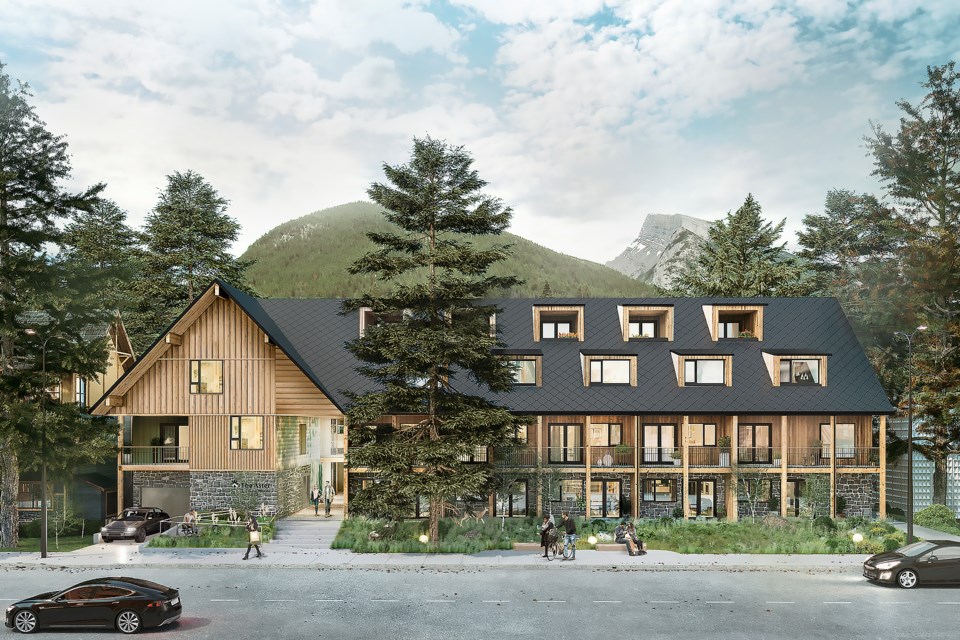BANFF – The Town of Banff’s below-market housing development on Banff Avenue has seen a hefty budget increase of almost $1 million due to unprecedented challenges associated with the COVID-19 pandemic.
At a meeting on Monday (Dec. 19), council unanimously approved a budget increase of $950,000 from $11.55 million to $12.50 million, which will come from a community housing reserve established for public housing projects.
Officials say construction started in January 2021 amid a pandemic that has resulted in supply chain issues, procurement challenges, and severe labour shortages, while the original contingency was swallowed up by groundwater quality problems.
“We’re between a rock and hard place on this one,” said Coun. Barb Pelham.
The Aster at 338-342 Banff Ave., originally slated to open in fall, is now on target to be completed and occupied by next summer. The 33 units have been sold to buyers at 30 per cent below appraised market value. About 87 per cent were first-time home buyers.
A for-purchase housing development, The Aster is financed through short-term debt and the sale of price restricted units through the Banff Housing Corporation. Like the Ti’nu rental development, this project is not taxpayer supported.
All units for The Aster were pre-sold at prices listed below market in anticipation of the project completion in fall 2022. The lottery and sales occurred in January and February 2022, resulting in all units being conditionally sold and deposits received.
Conditional purchase agreements have been signed by 33 buyers and final sales agreements for The Aster will be completed with the registration of the subdivision/condo plan with Alberta Land Titles. It is expected this will occur in early 2023.
Mayor Corrie DiManno said it is tough to designate additional funds of this magnitude to the project, but a decision was made to proceed with the project during the pandemic with the best information available at the time.
“I remember the conversation council had in 2020 about whether or not to proceed with The Aster in the midst of a pandemic and council’s north star was we will need housing into the future despite the current state of tourism and of the world,” she said.
“We did not know about some of the external factors to come from the pandemic – inflation, supply chain issues, severe labour issues and procurement challenges – and we did not know water would be a significant issue,” she added.
“Despite the unknown challenges that have plagued this project, my north star remains the same. We need more housing and this is evidenced by having pre-sold all 33 units and there’s already a wait list of those who were unsuccessful in the lottery.”
Administration said there was a shortage of framing companies, lack of trained labourers and tradespeople, and decreased availability of wood products across Alberta. Around the globe, shortages in many key products such as doors, windows, bathtubs, plastic piping, and countertops emerged.
“COVID-related restrictions and illness interrupted supply chains and production lines as well as reducing productivity rates on site,” said Sharon Oakley, housing sustainability manager for the Town of Banff.
“As with any housing development there is always a level of risk and a global pandemic exacerbated this, however, the interest and the need for housing in Banff remained unchanged.”
The Aster did include a contingency fund for unexpected costs.
However, in addition to the supply chain and market issues, there were also challenges with groundwater quality with elevated levels of selenium preventing discharge to the Bow River.
“Typically we always carry a contingency for owner risk such as de-watering, and I think if we had de-watering before COVID, we probably wouldn’t be here today,” said Adrian Field, director of engineering for the Town of Banff. “Having de-watering and COVID, those are two pretty big hits to this project.”
Councillors Hugh Pettigrew and Ted Christensen raised concerns about the escalating costs, questioning why the units were pre-sold before the final budget was known and whether the budget increase could be passed onto the home buyers.
“If I was a private developer, I am not too sure I could eat those costs,” said Pettigrew.
“Hopefully there’s some lessons learned. I think we’re doing the best we can now, it’s uncomfortable."
The extra $950,000 will come from the community housing reserve, which has a balance of just over $1 million as of Dec. 6 and is slated for another $318,000 contribution by year end.
The reserve is a result of a provincial funding contribution to the Ti’nu project, which established a fund as a lasting legacy for future affordable housing projects in Banff.
Since the $12 million provincial government contribution was made to the Ti’nu affordable housing project, the community housing reserve fund has been accumulating dollars from the operating surplus amounts generated from the Ti’nu rental revenues.
Council supported administration’s recommendation to cover the budget shortfall through the community housing reserve.
“It remains in line with our philosophy around not impacting taxes, and personally, I don’t believe it would be fair to download this unforeseeable expense onto the new homeowners,” DiManno said.




